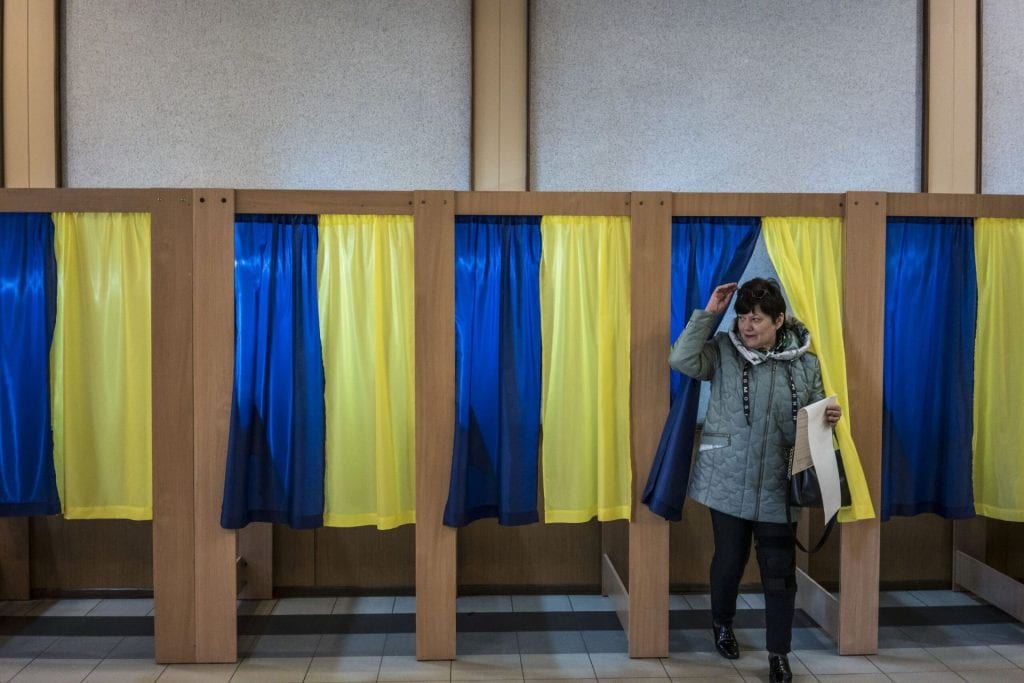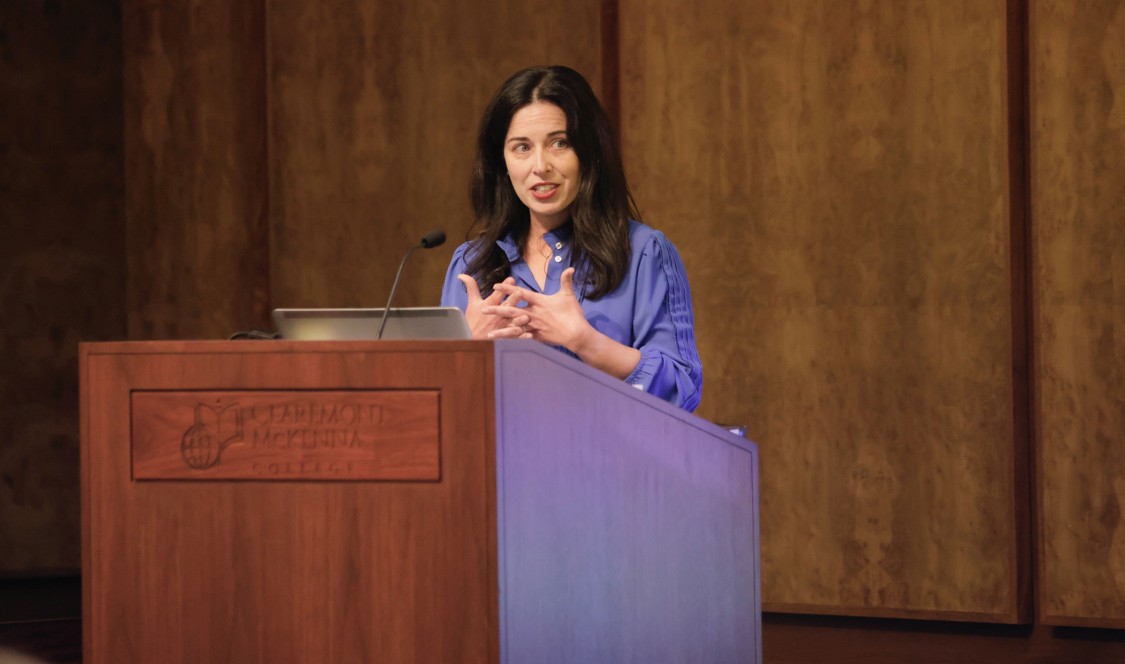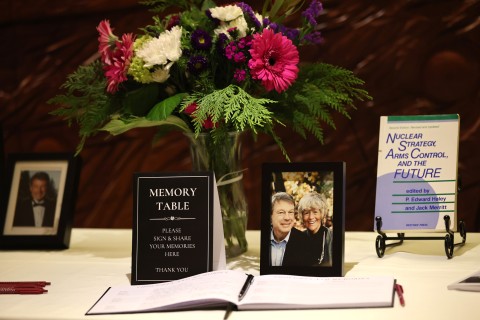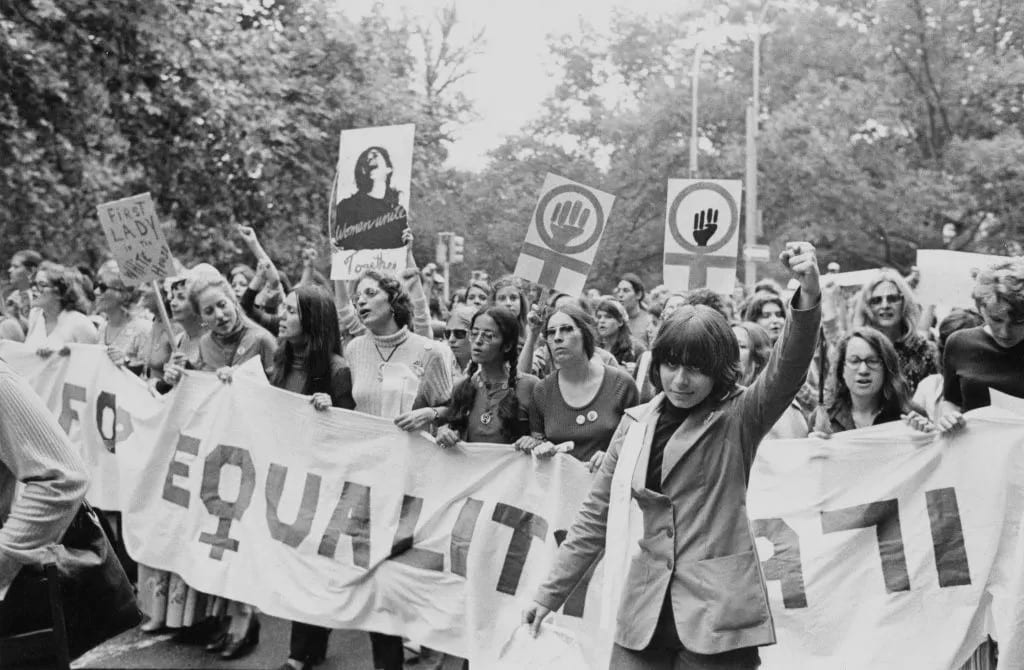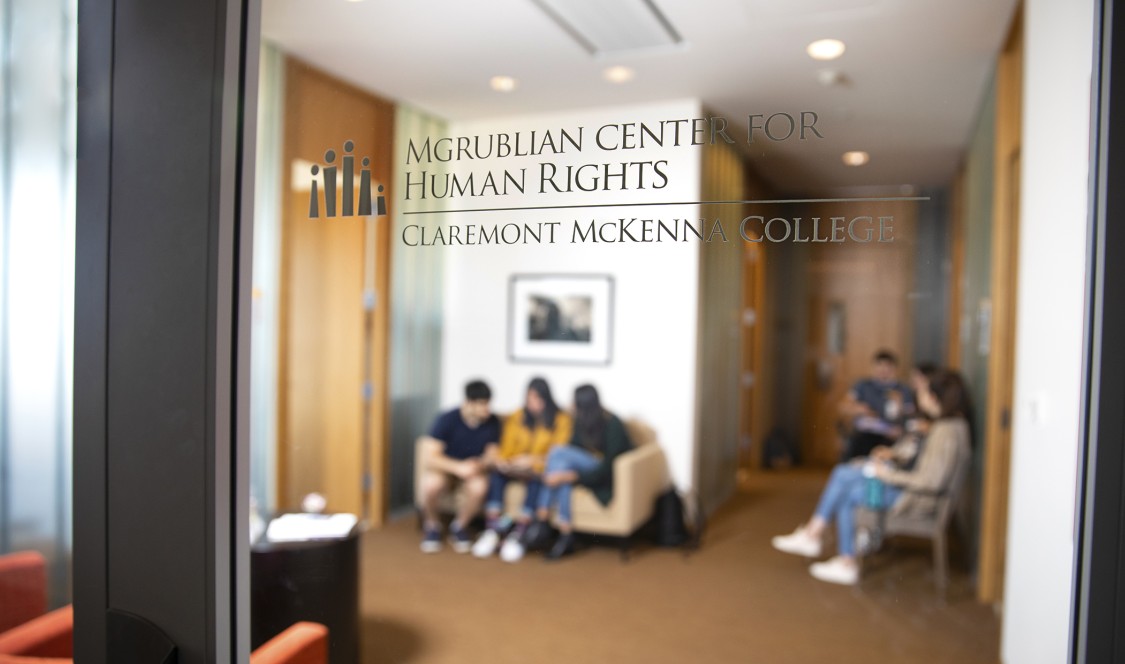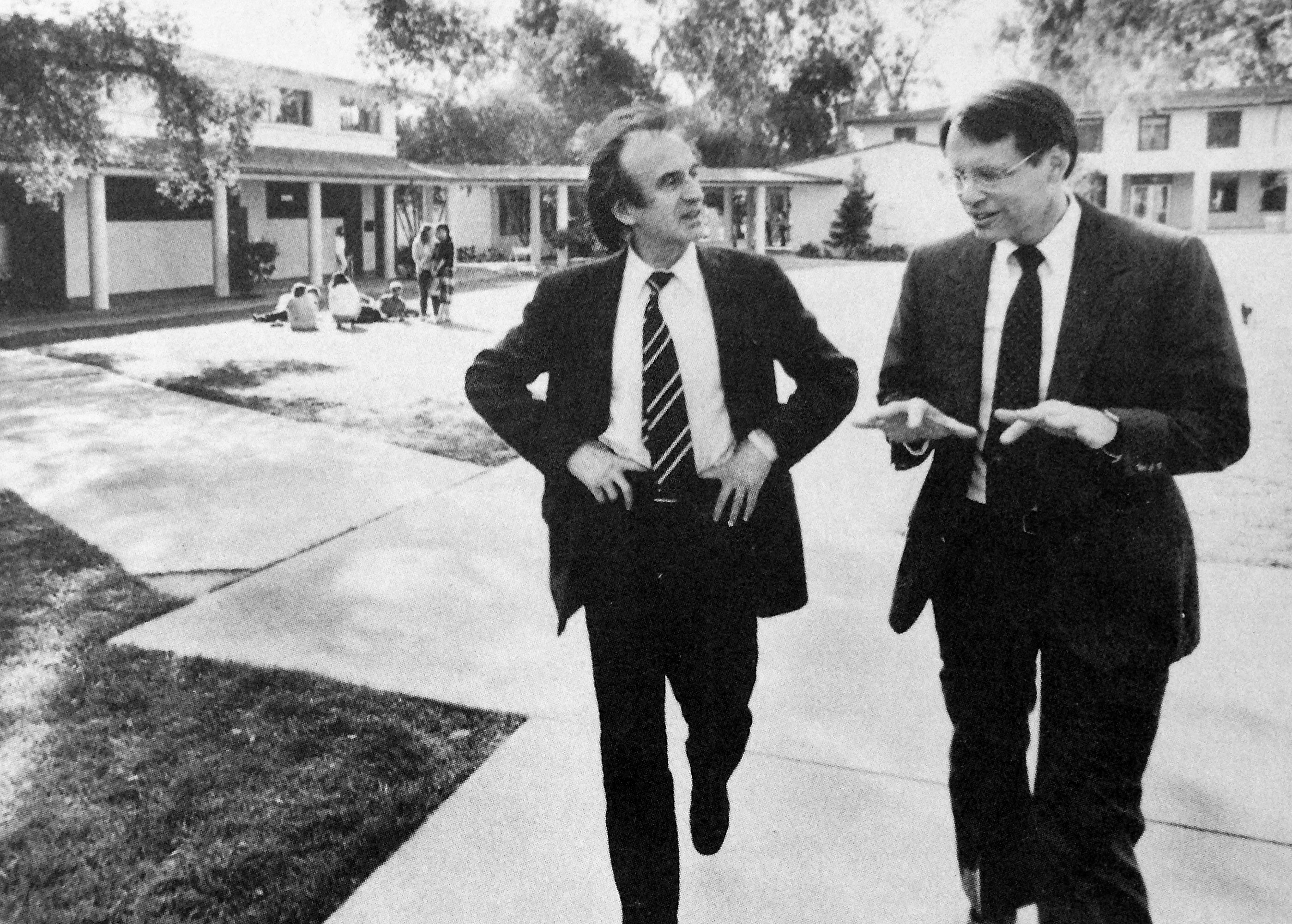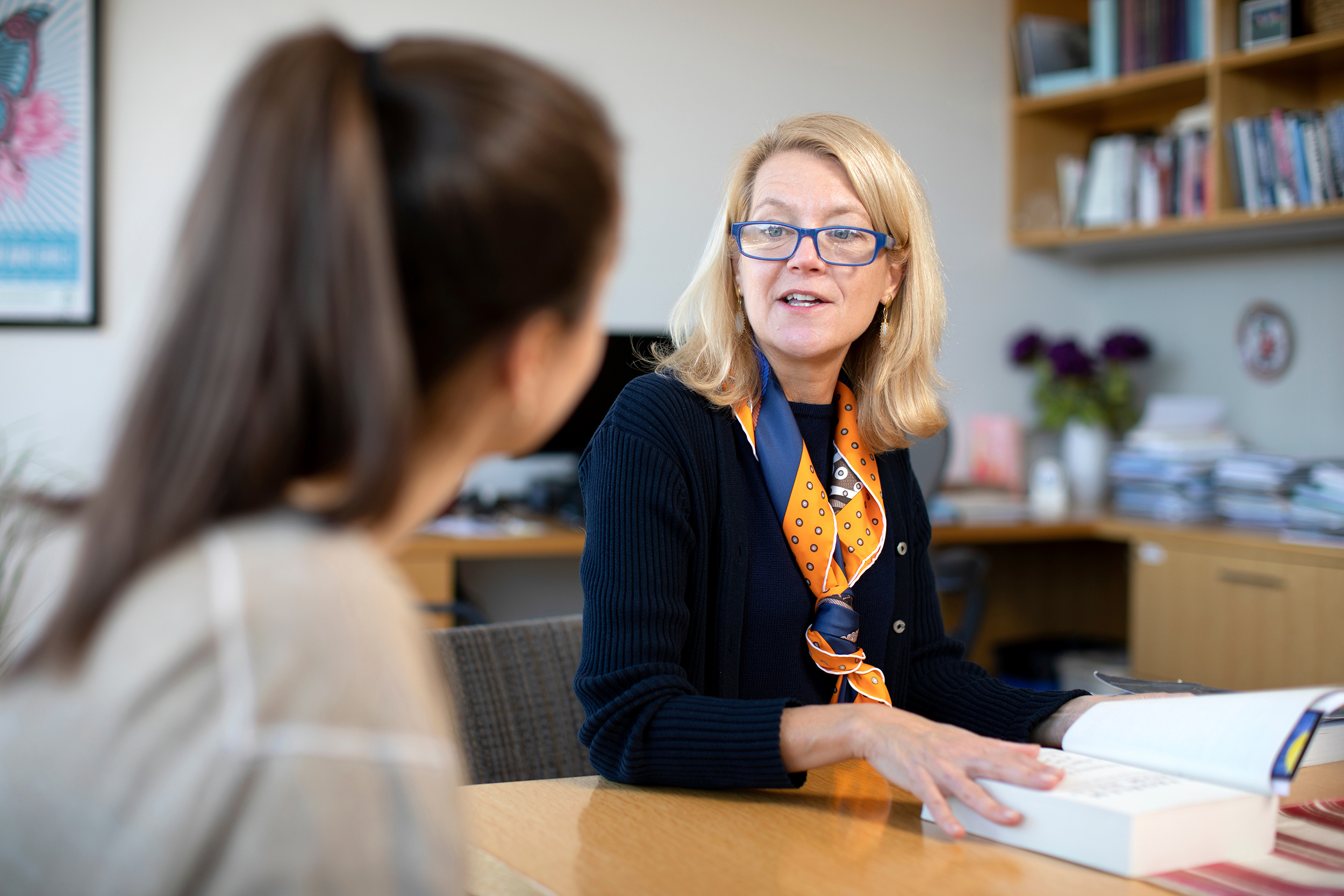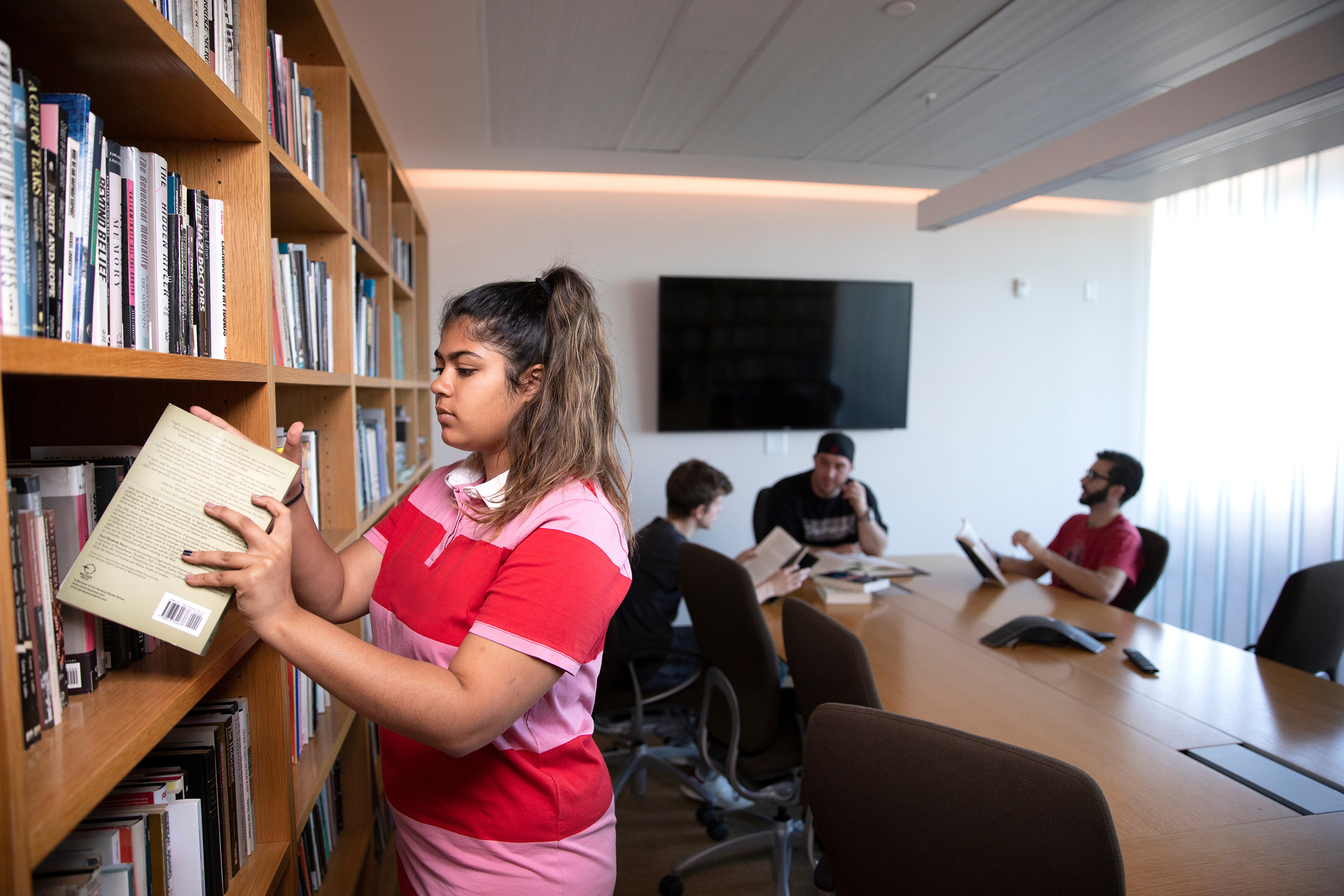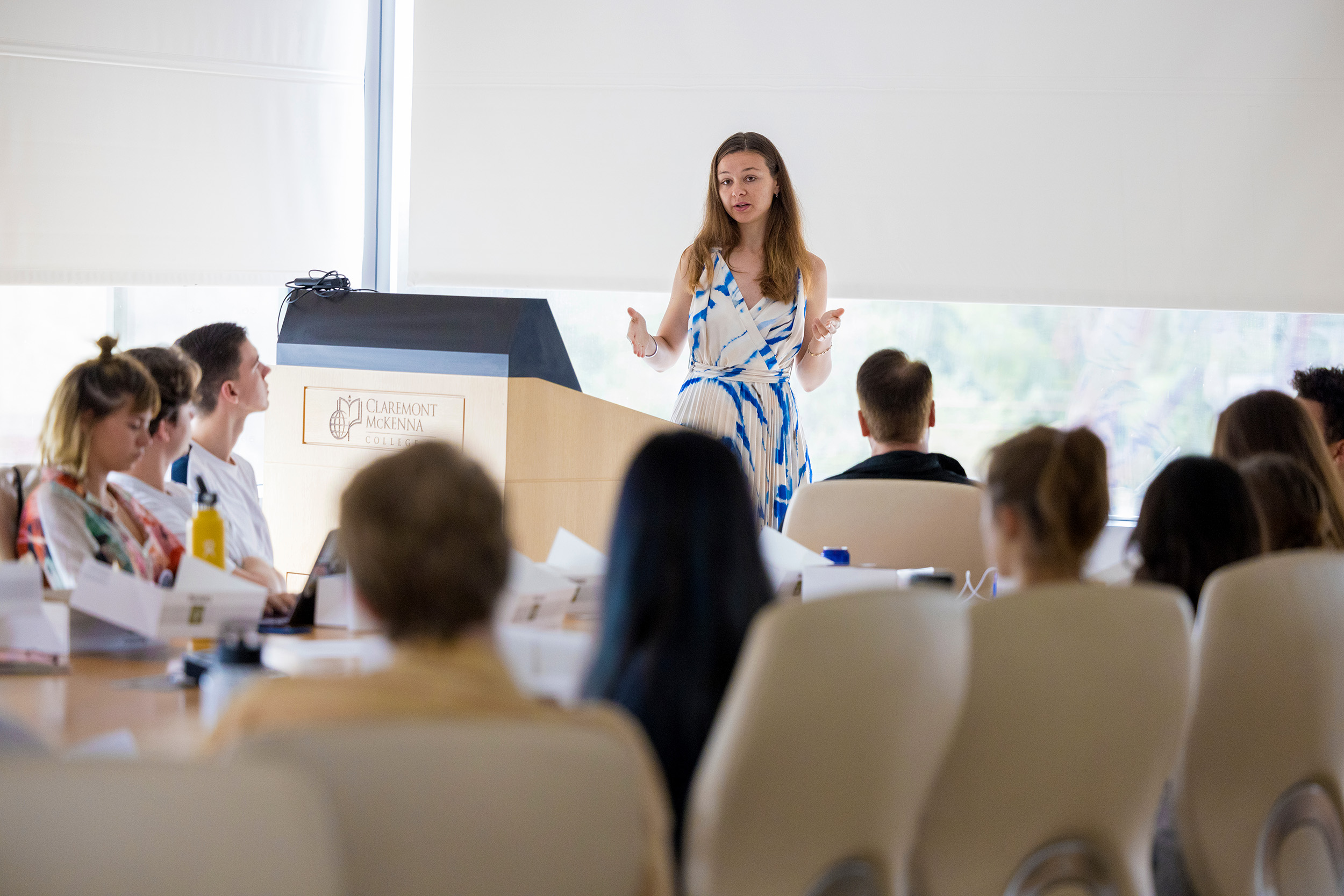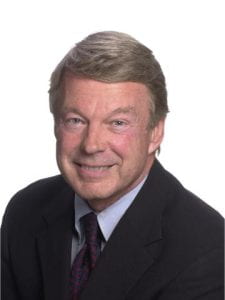By Thomas Rozwadowski
Mission matters more than ever at the Mgrublian Center
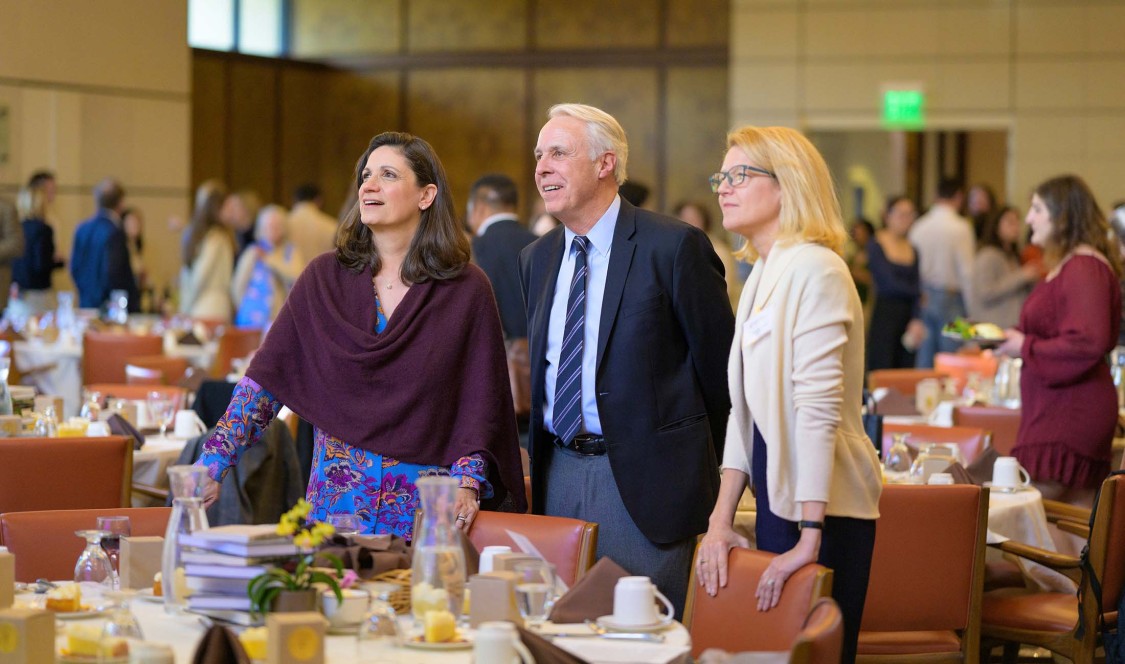
While CMC students have come and gone at the Mgrublian Center for Human Rights over the past decade, the recent clarion call by Professor Emeritus and Center co-founder John Roth—“to take nothing good for granted and to teach and act accordingly”—steadfastly remains a North Star for its daily work.
Since 2014, the Center’s vision has been shaped by Professor Wendy Lower, who announced recently she is stepping down as its longtime director. Together with the generous naming gift and strong support of former CMC Board of Trustees Chair David Mgrublian ’81 P’11 and his family, Lower helped steward the Center’s expansion of global reach and influence through multiple initiatives—among them, faculty and student research; broad alumni engagement and mentorship; a variety of internships, conferences, and archival trips; a commitment to Roth’s teaching, life lessons, and esteemed fellows program; and a budding national reputation thanks to institutional ties and collaboration far and wide, including the National Consortium of Human Rights Centers that Lower founded in 2016.
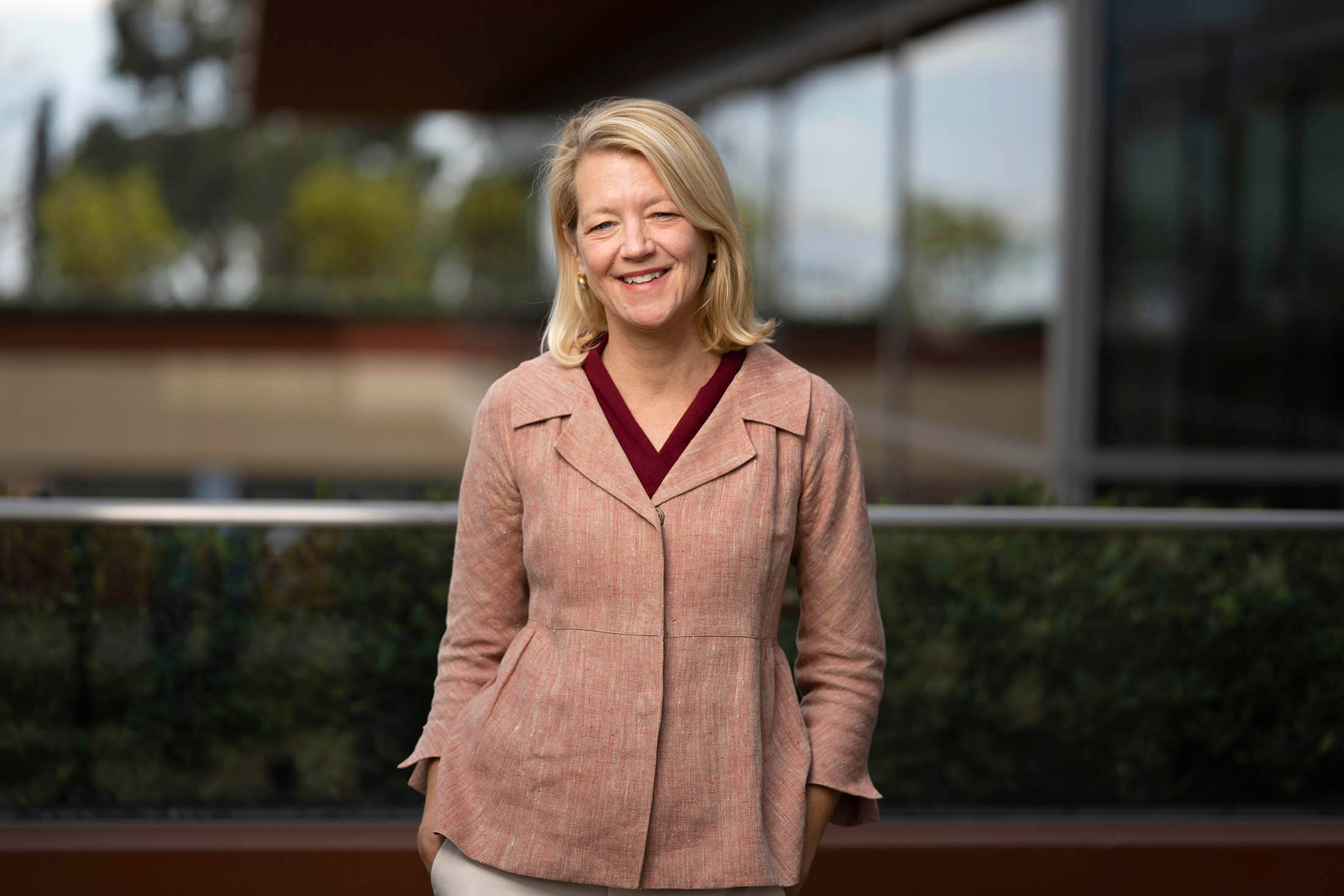
More than anything, Lower said the collective work of the Center and its partnership community is of vital importance to how CMC students are taught to engage with the world. As a historian of Nazi Germany who has written extensively about Holocaust history, she is acutely aware of “what is possible in dark times.”
“The mission of the Mgrublian Center matters now more than ever—to instill in students a human rights conscience and understanding of the lessons of the Holocaust, Armenian genocide, and other mass atrocities,” said Lower, the John K. Roth Professor of History and George R. Roberts Fellow at CMC.
“I am proud of the Center’s work and reputation … and I can find hope and solace knowing that each academic year our students flock to the Center eager to learn and do more for others—and that our graduates are in the world better aware of their rights and possibly actively defending them.”
What will a new era of leadership mean for the Mgrublian Center?
Look again to the wisdom of Roth, who believes the Center has found both “a worthy successor” to Lower and “a distinguished scholar and dedicated voice” for human rights who will “advance critical inquiry about fundamental ethical questions and respectful debate about pivotal events, continue and deepen the Center’s commitment to remember the Armenian genocide and the Holocaust that followed it, and encourage constructive dialogue in the spirit of the College’s distinctive Open Academy initiative.”
That prominent voice: Heather Ferguson, an associate professor of Ottoman and Middle Eastern history who has taught at CMC since 2011. Ferguson has been recognized globally for her interdisciplinary scholarship, which offers critical insights into governance, legal traditions, and human rights challenges, bridging historical inquiry with pressing modern concerns. In addition to her research and classroom contributions, Ferguson served in a significant leadership role at CMC as the founding co-director of The Open Academy and its campus-wide commitments to freedom of expression, viewpoint diversity, and constructive dialogue.
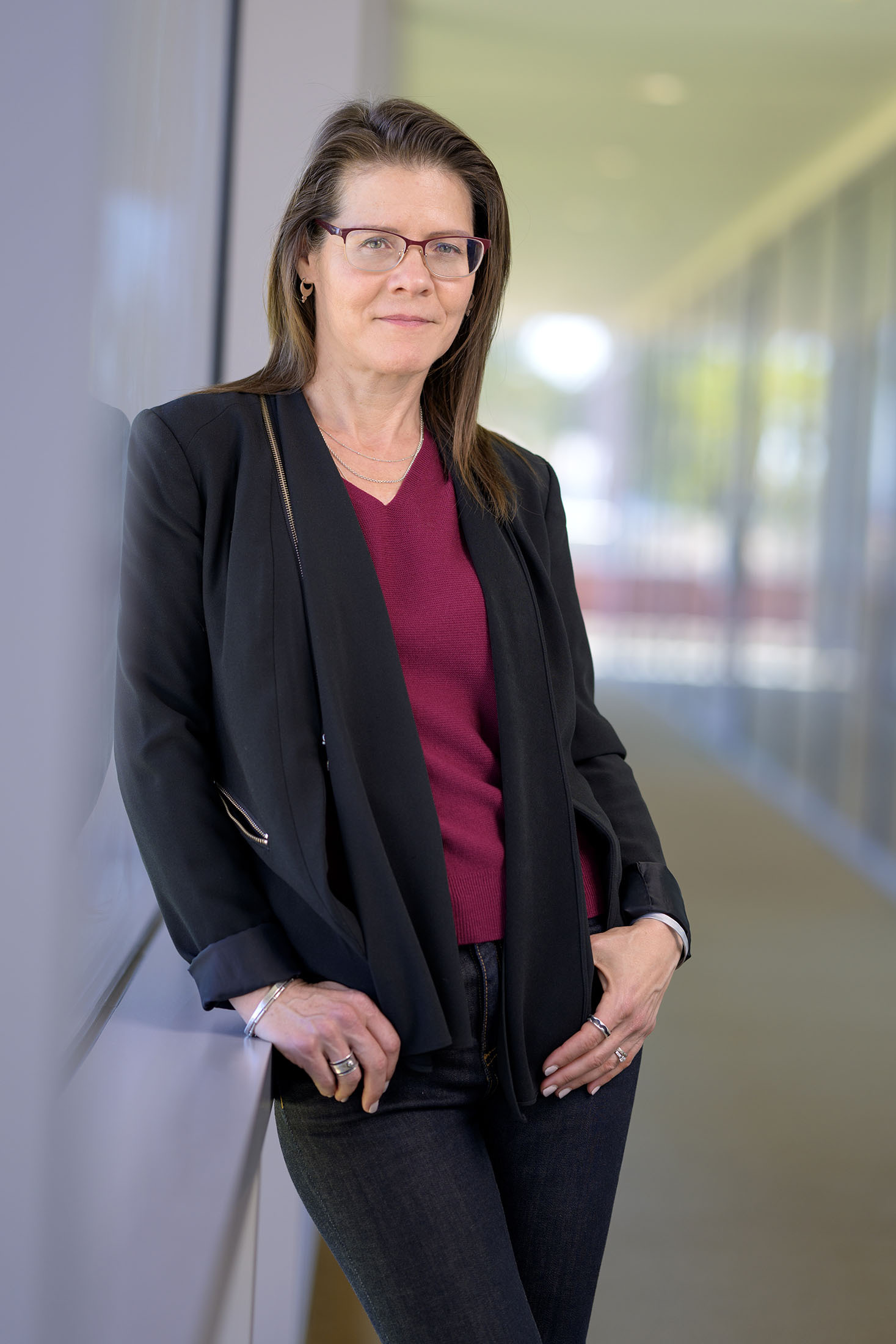
“When controversy ensues, Professor Ferguson will moderate thoughtfully, showing CMC students how important virtue does not impede but informs and enhances passionate commitment. Under her leadership, the Mgrublian Center will continue its growth from strength to strength,” Roth shared.
“Professor Ferguson will bring tremendous experience as a teacher and scholar of human rights in ways that are new and necessary. We will be able to expand and deepen programs on the historical lands of Armenia and the Ottoman Empire, and better educate on the global history of contemporary violations,” added Lower, further noting that Ferguson is a “role model of courage in her mentorship, scholarship, and human rights advocacy. She will innovate a new chapter of the Mgrublian Center as a deeply respected member of the Claremont community, a leader during especially challenging times.”
Ferguson’s key contributions upon leading The Open Academy with Professor Jon Shields since 2022 have included a variety of campus events and Athenaeum discussions, New Student Orientation training sessions, a robust Fellows Program, and Saturday Salons aimed at informally bringing together faculty, students, and visiting scholars with divergent viewpoints on critical—and at times controversial—topics of global significance. Professor Ioannis Evrigenis, who was recently appointed as The Open Academy’s new director, noted that last year, as most institutions of higher education faced “unprecedented challenges to open dialogue and viewpoint diversity, CMC and The Open Academy—under the leadership of Professors Ferguson and Shields—stood out as an enviable exception.” Evrigenis said he was “delighted” by Professor Ferguson’s appointment and looks forward to collaborating with her on jointly-sponsored events.
“The Mgrublian Center for Human Rights has a long legacy at CMC and has uplifted the importance of human rights education and research through many changes in the nation and around the globe. Now more than ever we need to invest in education that reinforces our collective commitment to international law and to the universal declaration of human rights,” said Ferguson, who will succeed Lower in July.
“I am honored by this appointment and look forward to continuing Wendy’s inspirational work, persevering in the central mission of the Center, and building new partnerships to reinforce our ethical commitment to deepen students’ understanding of how their choices and actions shape a better, more equitable future.”
Founded on the study of the Holocaust and genocide, the Mgrublian Center for Human Rights promotes human rights as a guiding principle in ethical decision-making, leadership, and global citizenship. Through research fellowships, academic programs, internships, and engagement with leading experts, the Center provides students with hands-on experience in addressing global human rights issues.
Ferguson said the Center will continue to engage students in critical study, remembrance, and reflection on the Holocaust and other genocides, reinforcing their relevance to contemporary human rights challenges. It will also remain a collaborative campus space for fostering dialogue, advancing scholarship, and equipping students with the knowledge and experience to confront human rights challenges in their personal and professional lives.
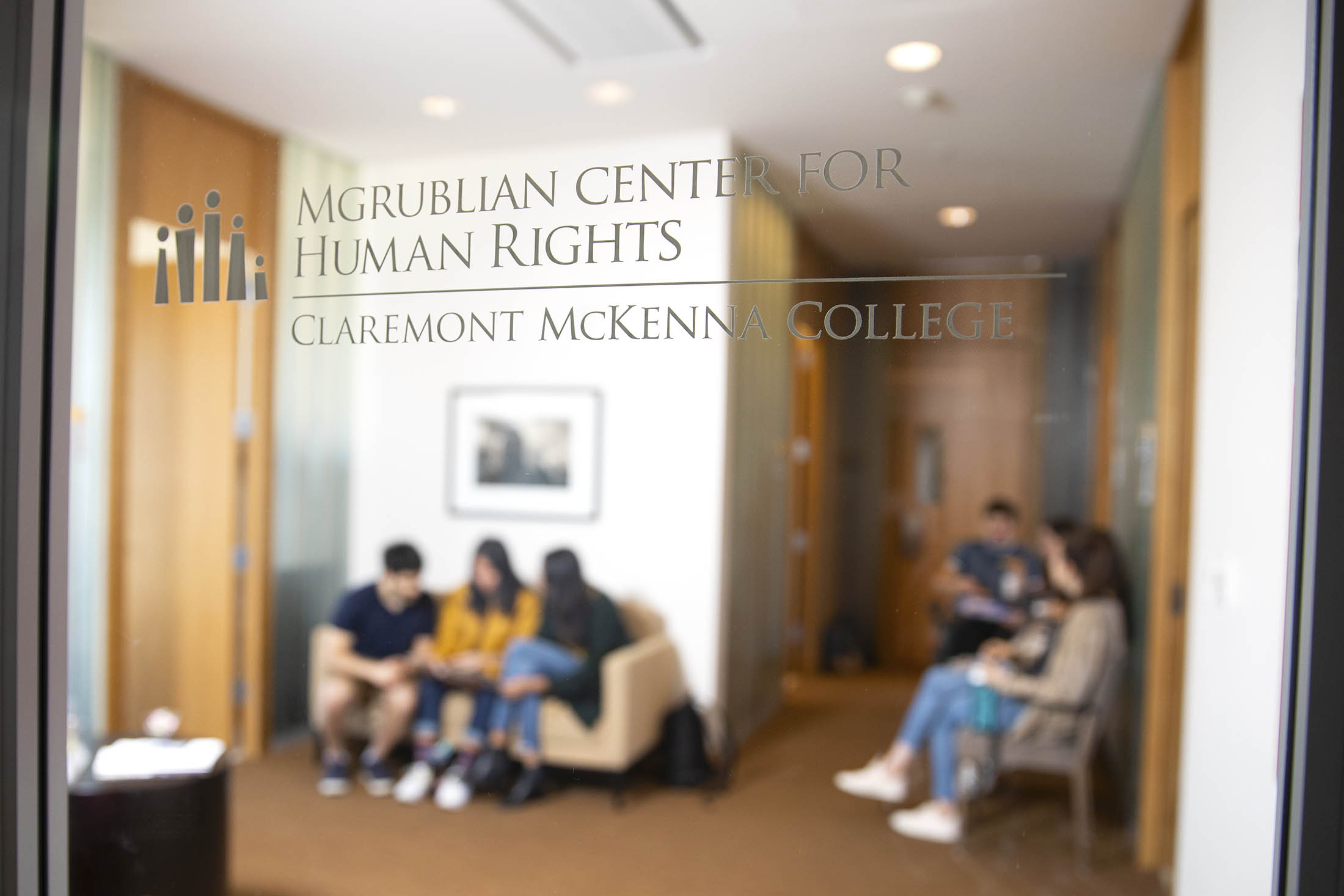
“At a time when human rights abuses are rampant around the world, the mission of the Mgrublian Center is vital: to foster in students—who will become leaders in their communities and in their fields—a deeper understanding of human rights in their lives,” said Alan Fenning ’72, Chair of the Mgrublian Center’s Advisory Board. “That sensitivity to, and awareness of, human rights is critical as they pursue their careers in business, finance, law, government, academia, science and technology, or another field.
“Professor Lower has propelled the Mgrublian Center to become a strong, impactful presence on campus and within the 5C community, and she has raised the Center’s stature within the human rights community,” he added. “Professor Ferguson, with her passion for human rights and her outstanding scholarship and teaching, will be able to take up the mantle from Professor Lower to continue to expand the Mgrublian Center’s programming, to enrich the experience for students involved with the Center, and to enhance its reputation.”
Under Lower’s leadership, the Mgrublian Center promoted several signature opportunities, including a professional networking trip to Washington, D.C. and a counter-terrorism simulation, while promoting powerful community engagement—for instance, through the work of visiting Ukrainian journalist Anna Romandash. The Center notably co-hosted the 2016 and 2024 Lessons and Legacies conferences on Holocaust and genocide studies and has supported meaningful fellowships, including the Elbaz Post-Graduate Fellowship for alumni working in human rights law and advocacy. Most recently, Lower spearheaded the Center’s 20th anniversary celebrations, underscoring its longstanding commitment to human rights education and scholarship.
Ferguson holds a BA in Religion and Literature from La Sierra University, an MA in Middle Eastern Studies from the University of Texas at Austin, and a Ph.D in History from the University of California, Berkeley. The winner of CMC’s highest teaching honor—the Glenn R. Huntoon Award for Superior Teaching in 2021—and a 2025 Dean’s Award for Distinguished Service (with Shields in recognition of their Open Academy work), Ferguson is a deeply respected educator and scholar known for fostering discussions that welcome the widest array of viewpoints and backgrounds.
She “truly embodies the ideal of a CMC faculty member—a distinguished teacher-scholar who brings her expertise to bear on important contemporary issues. She has long been engaged with the work of the Mgrublian Center. I’m excited to see her lead it into its next chapter,” said Heather Antecol, Vice President for Academic Affairs and Dean of the Faculty and James G. Boswell Professor of Economics.
Additionally, Ferguson has authored numerous articles and publications, and in 2019, earned the prestigious Koprülü Book Prize from the Ottoman and Turkish Studies Association for her book, The Proper Order of Things: Language, Power, and Law in Ottoman Administrative Discourses. Ferguson has received grants from the National Endowment for the Humanities and two American Council of Learned Societies Fellowships, served as an editor for the Journal of Ottoman and Turkish Studies and Review of Middle East Studies (and additionally, will be future co-editor of the International Journal of Middle East Studies), and led in a variety of roles across CMC and The Claremont Colleges, including work on the Athenaeum Committee, the Board of Trustees Academic Affairs Committee, and The Claremont Colleges’ Consortial American Association of University Professors Chapter.
“We could not be more fortunate or more moved,” added President Hiram Chodosh, “by the generous support and leadership of the Mgrublian family, the legacy of John Roth, and the triple-threat commitments of Professor Lower and Professor Ferguson to world-class scholarship, student-centric pedagogy that engages the broadest range of perspectives on controversial questions, and leading innovation in human rights education.”
Thomas Rozwadowski is Executive Director of Strategic Communications: Admission, Advancement, and President’s Office at Claremont McKenna College.


